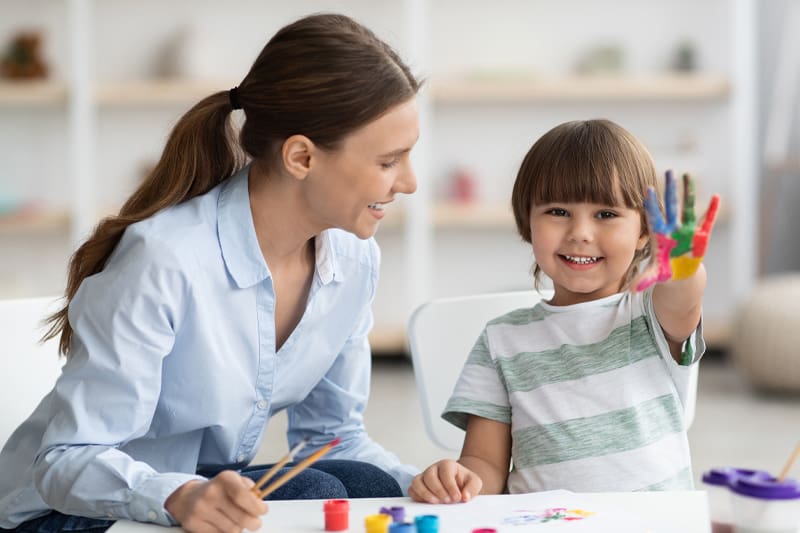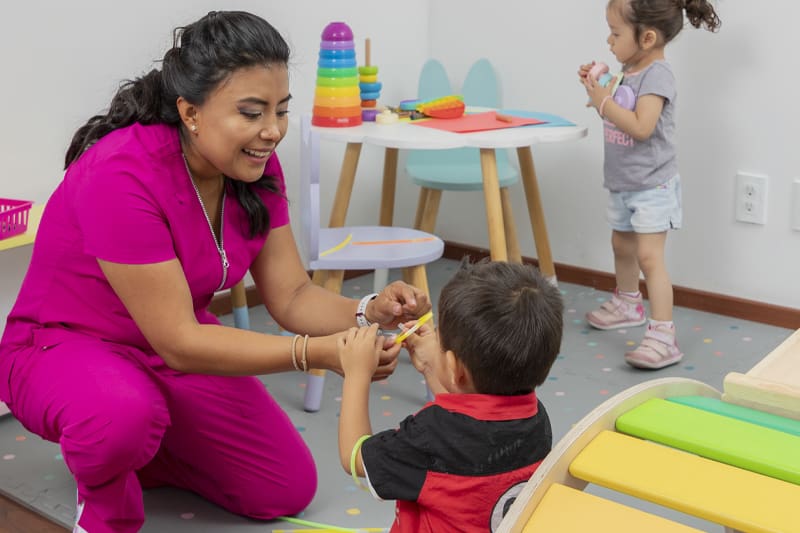Coping Skills
at CST Academy
Resilient Minds. Calm Bodies. Confident Kids.
At CST Academy, our therapeutic preschool program helps children develop coping skills that support emotional regulation, reduce frustration, and build confidence in navigating daily challenges. Whether your child has difficulty managing transitions, handling disappointment, or regulating their energy, our expert team provides supportive, structured guidance tailored to their unique needs.
Get Started

What Are Coping Skills?
Coping skills are the tools children use to manage their emotions, calm their bodies, and respond to stress or change. These may include deep breathing, asking for help, using positive self-talk, or recognizing when to take a break. At CST Academy, we view coping skills as essential building blocks for emotional resilience and long-term well-being.
Our therapists use play-based, evidence-informed approaches to teach these skills in meaningful, engaging ways. Children learn not only how to cope—but how to thrive—across environments.
Our therapists use play-based, evidence-informed approaches to teach these skills in meaningful, engaging ways. Children learn not only how to cope—but how to thrive—across environments.
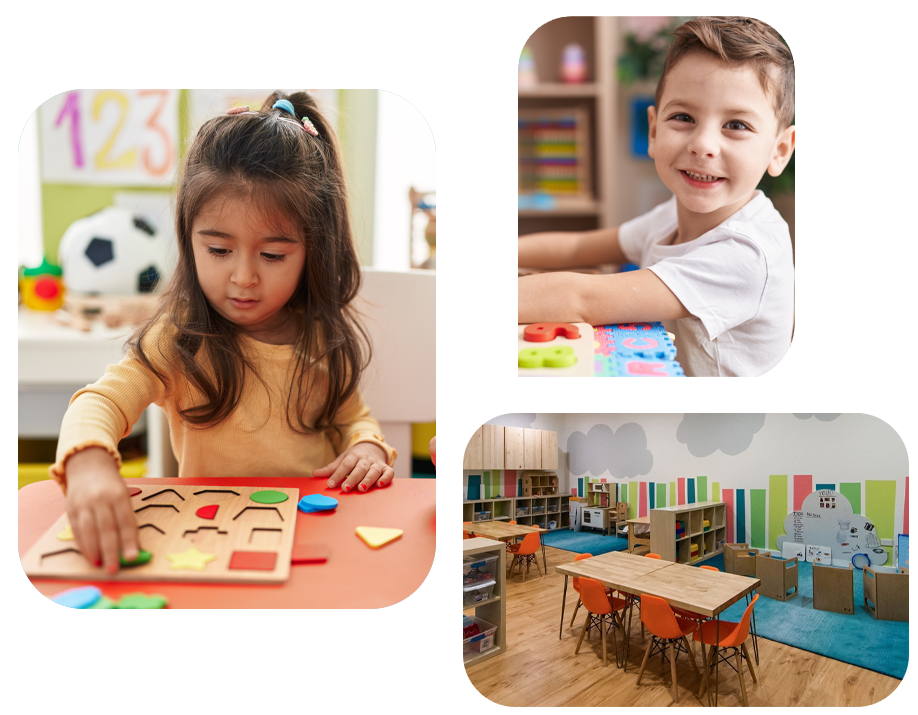
Why Choose CST Academy for Coping Skills?
CST Academy’s therapeutic preschool is designed to help children grow socially, emotionally, and behaviorally in a supportive and structured environment. Our interdisciplinary team—including ABA, occupational, speech, physical, and feeding therapists—collaborates closely to address the unique coping needs of each child.
We partner with families every step of the way, providing updates, strategies, and resources so that children can continue to develop healthy coping skills at home, school, and beyond.
We partner with families every step of the way, providing updates, strategies, and resources so that children can continue to develop healthy coping skills at home, school, and beyond.
The CST Academy Difference
Choosing the right support for coping skills means finding a team that understands your child’s emotional world and helps them navigate it with confidence. At CST Academy, we create a safe, nurturing environment where children can explore big feelings, develop healthy strategies, and build resilience through everyday experiences. With expert therapists, personalized care, and collaborative guidance, we empower each child to face challenges calmly—and grow stronger every step of the way.
Building Tools for Life
At CST Academy, we help children build the emotional foundation they need to manage life’s ups and downs with confidence. Our approach to coping skills includes practical strategies, guided practice, and compassionate support designed to help children feel more secure and in control.
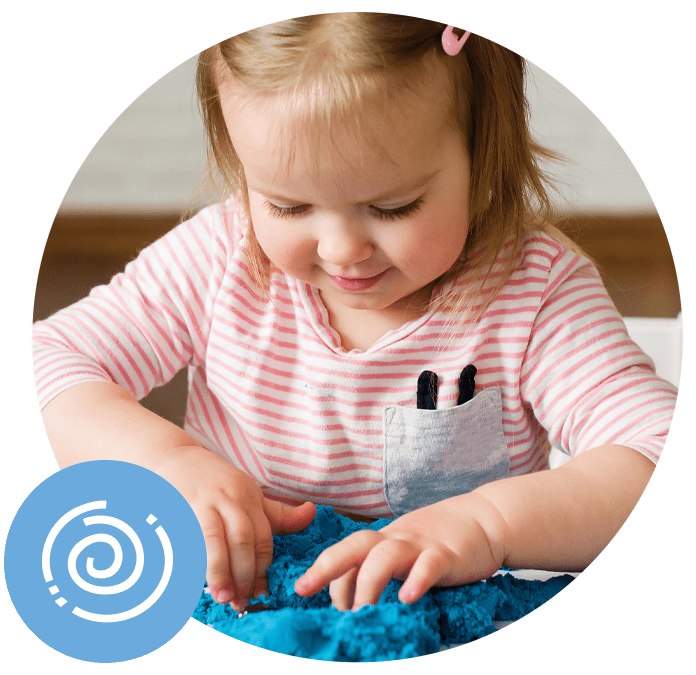
Using Calming Strategies
From deep breathing and sensory breaks to quiet corners and self-soothing techniques, we teach children a variety of calming tools they can access during moments of overwhelm. These strategies become part of their daily routines and help prevent meltdowns before they escalate.
Understanding and Naming Emotions
Children first need to recognize and label their emotions to begin managing them. We use visual aids, stories, and play-based interactions to help children identify what they’re feeling—whether it’s frustration, excitement, sadness, or joy—and express it in healthy, age-appropriate ways.
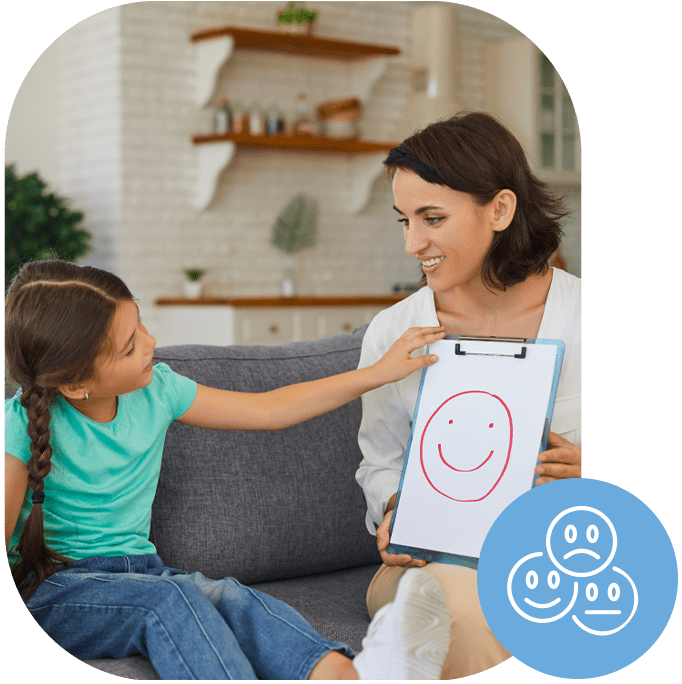

Practicing Problem-Solving
We guide children through common challenges—like sharing, waiting, or not getting their way—by teaching simple steps to evaluate a situation and make a plan. This gives them confidence to navigate conflict or frustration with greater independence.
Developing Flexibility and Adaptability
Coping often means learning to adjust when things don’t go as planned. Through gentle exposure and support, we help children become more comfortable with transitions, schedule changes, and unexpected events—building emotional resilience.


Expressing Needs in Healthy Ways
Many children struggle with big feelings because they can’t communicate what they need. We work on giving them the language, gestures, or tools (like visuals or AAC devices) to ask for help, take a break, or explain how they’re feeling without acting out.
Building Confidence Through Success
Coping skills grow stronger with every small win. We celebrate each child’s efforts and progress, reinforcing their belief that they can handle challenges—one step at a time.

Start Your Journey with CST Academy Today
Getting started is easy. Our team is here to listen, guide, and create a care plan tailored to your child and your family.
"*" indicates required fields
When to Support Coping Skills Development
Every child experiences big emotions—but when those emotions frequently lead to distress, shutdowns, or outbursts, it may be time to focus on developing coping skills. Here are some signs that your child could benefit from structured emotional support and guidance.
Frequent Tantrums or Meltdowns
If your child becomes overwhelmed easily and has intense emotional reactions that are difficult to calm, they may need help developing strategies to regulate and manage their feelings.
Difficulty Expressing Emotions
Children who struggle to name or talk about their emotions often internalize frustration or act out. Teaching them to identify and communicate what they feel is a key step in developing healthy coping mechanisms.
Avoidance of Challenging Situations
Does your child try to escape or shut down in unfamiliar or stressful environments? Avoidance can be a sign that they lack the tools to cope and need structured, supportive practice.
Heightened Sensitivity to Frustration
If minor changes or challenges lead to big emotional reactions—like crying, yelling, or refusing to participate—your child may benefit from learning how to handle frustration in more constructive ways.
Rigid Thinking or Inflexibility
Children who have difficulty going with the flow or adapting when things don’t go as expected often feel emotionally stuck. Supporting flexibility helps build resilience and reduce emotional reactivity.
Trouble Rejoining After Upsets
Some children have difficulty bouncing back after getting upset, missing out on social or learning opportunities. Coping skills training can help them recover more quickly and feel more confident moving forward.
Empowering Emotional Growth, One Strategy at a Time
At CST Academy, we believe that every child deserves the tools to navigate their emotions with confidence and resilience. Our therapeutic preschool program is a nurturing space where children can explore, express, and manage their feelings in a supportive and structured environment. We meet each child where they are—helping them build essential coping skills while celebrating their individuality.
We understand that big emotions can feel overwhelming, not just for children but for families too. That’s why our team takes a compassionate, whole-child approach to emotional development, blending expert guidance with playful learning and consistency. Whether a child is learning to handle frustration, adapt to change, or recover from setbacks, we’re here to guide them—step by step—toward greater self-awareness, self-regulation, and emotional success.
We understand that big emotions can feel overwhelming, not just for children but for families too. That’s why our team takes a compassionate, whole-child approach to emotional development, blending expert guidance with playful learning and consistency. Whether a child is learning to handle frustration, adapt to change, or recover from setbacks, we’re here to guide them—step by step—toward greater self-awareness, self-regulation, and emotional success.

Helping Children Handle Big Feelings with Confidence
We were overwhelmed by our son’s frequent meltdowns and didn’t know where to turn. CST Academy helped him learn to express his feelings in a healthy way—and helped us understand how to support him at home. He’s calmer, more confident, and finally thriving in group settings.
– Natalie M.
Our daughter had such a hard time adjusting to new situations, but the team at CST Academy completely changed that. They’ve given her real tools to manage her emotions, and now she’s able to cope with challenges instead of shutting down. It’s been life-changing for our whole family.
– Jason T.
The coping skills our child has learned at CST Academy have made such a difference. The therapists are incredibly kind and patient, and they make everything feel like play while helping kids work through tough moments. We couldn’t be more grateful.
– Emily R.

Supporting Coping Skills in CST Academy’s Therapeutic Preschool
Helping Children Understand, Express, and Regulate Big Emotions
At CST Academy, our Therapeutic Preschool program is uniquely designed to help children build strong coping skills through a supportive, play-based environment. Whether your child struggles with frustration, emotional regulation, or adapting to challenges, we provide evidence-based strategies that help them feel safe, seen, and successful. Our interdisciplinary team collaborates to help children navigate their emotions with confidence—laying the groundwork for resilience that lasts a lifetime.
Therapeutic Preschool
Get Started
Frequently Asked Questions
About Coping Skills at CST Academy
Coping skills are strategies children use to manage emotions, handle stress, and navigate everyday challenges. These tools are essential for healthy development, especially in a preschool setting where social and emotional growth is key.


